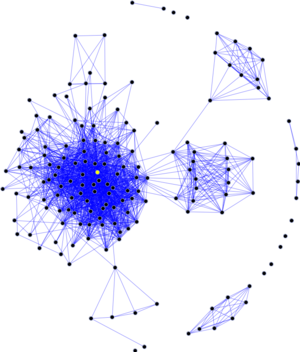 Image via WikipediaI am reviewing ID literature and textbooks, and I am dissatisfied with the formulaic approaches that assume things like uniform standards, that the stake-holders know what the standards are, all the students will meet the same outcomes the same way, etc. You can read many of these books and articles and actually pretend that the Internet never happened. There has not been much progression beyond ADDIE. Instructional design, seen from the standard literature, feels mechanistic and trapped in a behaviorist input-output model. The huge holes in current thinking on instructional design include the Internet, social networks, and new media. The other missing piece is the social milieu of the individual schools and programs: each school has a different student population, different teachers with different backgrounds and experiences. I am still having conversations with teachers and other ID folks on constructivist (student-centered) approaches to teaching and learning versus behavioralist (carrot and stick). Meanwhile, current instructional design models and their proponents are all looking at what is happening online and trying desperately to hammer it into our conceptions of pedagogy that were not just created before social networks but before the internet. I read about a model that was being proposed in a copy of "eCampus" a while back and it included all of these great interlocking circles and arrows about content and visual pedagogy (on top of the usual behaviorist model) and no where in the model was there a connection between the students and teachers.
Image via WikipediaI am reviewing ID literature and textbooks, and I am dissatisfied with the formulaic approaches that assume things like uniform standards, that the stake-holders know what the standards are, all the students will meet the same outcomes the same way, etc. You can read many of these books and articles and actually pretend that the Internet never happened. There has not been much progression beyond ADDIE. Instructional design, seen from the standard literature, feels mechanistic and trapped in a behaviorist input-output model. The huge holes in current thinking on instructional design include the Internet, social networks, and new media. The other missing piece is the social milieu of the individual schools and programs: each school has a different student population, different teachers with different backgrounds and experiences. I am still having conversations with teachers and other ID folks on constructivist (student-centered) approaches to teaching and learning versus behavioralist (carrot and stick). Meanwhile, current instructional design models and their proponents are all looking at what is happening online and trying desperately to hammer it into our conceptions of pedagogy that were not just created before social networks but before the internet. I read about a model that was being proposed in a copy of "eCampus" a while back and it included all of these great interlocking circles and arrows about content and visual pedagogy (on top of the usual behaviorist model) and no where in the model was there a connection between the students and teachers.We have an opportunity in course design, to bring all of the stake-holders to the table. Course design should not just be up to a dept. or a single teacher. Course development can be an opportunity to bring in a librarian, someone from student advising, disabled student services and programs, and developmental education. A course design process can show an instructor how to connect their classroom with other students, instructors, and experts in the field. It can be an opportunity to connect students with professional networks as well as other colleges and schools. What I have been finding is that when you bring everyone to the table to talk about a course, you can discover many different ways to connect your course to the community than you would have ever thought of yourself.
I would like to write (or facilitate) a course development guide that will incorporate open education resources and social networks and connectivism. This project will be hosted in Google Docs or on a wiki. If you are interested in participating, leave a comment below and I will include you on the list.

No comments:
Post a Comment